4 Latin America and the Caribbean
The Latin American and Caribbean region boasts an enormous market with a population of 640 million and a regional GDP of approximately $6 trillion as of 2017 and is also a region of strategic importance for trade. This region has also consistently enhanced its presence in the international community through rooted democracy and as a supplier of iron ore, copper, silver, rare metals, crude oil, natural gas, biofuels, and other minerals and energy resources, as well as food resources. Besides, this region has a traditionally strong personal and historical bond with Japan thanks to the community of Japanese immigrants and descendants (the Nikkei community) numbering more than 2 million and thus Japan has maintained stable and friendly relations with this region for a long period.
Although the average income level in the region is relatively high among ODA recipient countries, the region is characterized by significant income disparities between the rich and the poor, as well as a large number of people who suffer from poverty. In addition, while it is a region with a rich natural environment such as the tropical rainforests of the Amazon, it is also vulnerable to natural disasters such as earthquakes and hurricanes. Therefore, it is also important to make efforts to address environmental issues, climate change and disaster risk reduction.
■Japan’s Efforts
●Efforts Toward Disaster Risk Reduction and Environmental Issues
The Latin American and Caribbean region is prone to natural disasters such as earthquakes, tsunamis, hurricanes, and volcanic eruptions. Therefore, Japan’s assistance for this region, utilizing Japan’s knowledge and experience in the field of disaster risk reduction, is of great importance. Japan has provided a cumulative total of more than $310 million for reconstruction support to Haiti, which suffered catastrophic damage from the huge earthquake with a magnitude of 7.0 that occurred in 2010, as well as assistance that utilizes Japan’s expertise in the disaster risk reduction field to Caribbean countries, and countries facing the Pacific Ocean including Mexico, Peru, and Chile, where earthquakes frequently strike. Japan has also provided emergency relief goods to Caribbean countries including Antigua and Barbuda, Dominica, and Cuba, which had suffered damage from repeated hurricanes.
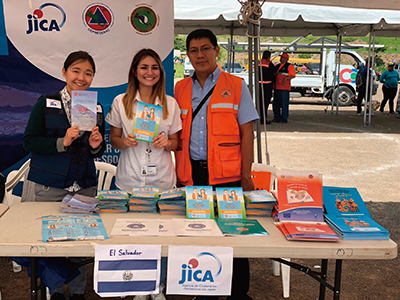
Event marking the 20th anniversary of Hurricane Mitch, held in November 2018 as a part of the BOSAI project (Photo: JICA)
As for Brazil, after the largest and most severe landslide disaster in the history of the country occurred in 2011, Japan implemented a comprehensive disaster risk reduction cooperation project from 2013 to 2017 with the aim of mitigating landslide risk. In the project, it offered cooperation on strengthening comprehensive disaster response capability, including identifying disaster risks, city expansion planning based on these risks, monitoring, and transmission of information. These project activities raised Brazil’s interest in Japan’s advanced disaster risk reduction technology, and as a result, the relevant personnel visited Japan in 2018 to learn the technology of erosion control dam banks. Rainfall radars were also introduced in the State of Paraná in Brazil. In the Latin America and Caribbean region, where population concentration in urban areas is growing at an accelerated pace, the disaster risk reduction technology of Japanese corporations is expected to become wide-spread (For details on the provision of earthquake simulation vehicles from Japan in Peru, refer to “Master Techniques from Japan to the World”).
Furthermore, the Project on Capacity Development for Disaster Risk Management in Central America named “BOSAI,” which aims to share knowledge on disaster risk reduction and reduce disaster risks at the local community level, has achieved significant results in the region.
As for the Caribbean countries, Japan provides support from perspectives other than those based on per capita income, as the aim is to overcome the unique vulnerabilities of small, developing island countries against climate change and natural disasters. At the same time, in addition to developing disaster-resilient bridges and emergency communications systems, and supplying equipment that contributes to strengthening the ability to cope with disasters, Japan also provides technical cooperation and support for climate change measures in a wide area of eight Caribbean countries.
Moreover, Japan has been providing cooperation on a wide range of environmental issues in the region, including assistance for scientific and technological research on climate phenomena, conservation of biodiversity, broad-range evaluation of carbon dynamics (Note 7) in the Amazonian forests, and construction of waste disposal facilities. In the area of renewable energy, which has been receiving wider attention in recent years, Japan provides support for introducing solar power generation in many countries, as well as for constructing geothermal power plants in Costa Rica, Bolivia, and elsewhere. Japan has also decided to provide an ODA loan to Jamaica to promote the introduction of energy-saving measures. Also, for the Caribbean countries, Japan contributes to promoting the sustainable use of limited marine resources by developing facilities and dispatching experts in the fisheries field.
●Infrastructure Development
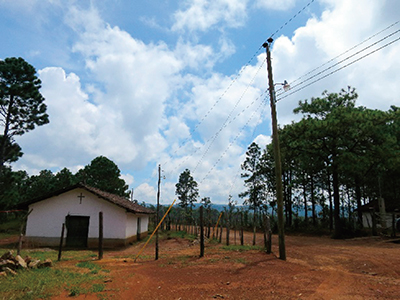
Yamaranguila in Intibucá Department, located in the western part of Honduras, where electrification has been completed through the Grant Assistance for Grass-Roots Human Security Project. By building utility poles, residents are now able to use electricity. (Photo: Embassy of Japan in Honduras)
Latin America and the Caribbean have also been drawing attention in recent years as a production base and market for industries, attracting many Japanese corporations into the region. From the perspective of developing a foundation for the economic development of Latin American and Caribbean countries, Japan is also actively engaged in developing infrastructure in the capital region and the countryside. In 2018, Japan made the decision to provide grant aid to Bolivia for the improvement of logistics and development of its domestic economy.
In addition, Japan has also worked on spreading Japan’s terrestrial digital broadcasting system (ISDB-T format) through public-private collaboration, particularly in Latin America and the Caribbean. As of December 2018, 14 countries in Latin America and the Caribbean adopted the Japanese system. Toward these countries, Japan provides support for technology transfer to enable the smooth introduction of the system, as well as carries out human resources development.
●Bolivia
International Course on Diagnosis and Treatment of Gastrointestinal Diseases, Phase 2
Technical Cooperation (Third Country Training) (October 2015 – October 2018)
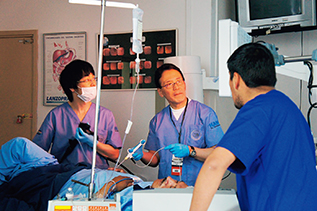
Practical skills instruction by Dr. Shinya Odajima of Teikyo University (Photo: JICA)
Among the countries of Central and South America, the modernization of diet has resulted in increasing numbers of patients with stomach and large bowel cancer, and other gastrointestinal diseases, and Bolivia is no exception.
Japan has supported Bolivia for over 40 years in the improvement of medical services, such as the diagnosis and treatment of gastrointestinal diseases. The “Bolivian-Japanese Institute of Gastroenterology,” which was constructed in the capital, La Paz, through a Grant Aid in 1979 is one out of several centers for support and cooperation in the health and medical sector by Japan. It was selected in 2001 as the best hospital in the country, and was recognized in 2005 as the first World Gastroenterology Organisation (WGO) training center in Central and South America. Since 2005, more than 500 medical professionals from 18 countries in the region have attended the training.
At the 14th International Training Course in 2018 (April 11–18), 16 foreign lecturers from countries including the U.S., Spain and Japan participated, and doctors from Teikyo University and Kyushu University served as lecturers from Japan. Japanese companies, namely Olympus Corporation, FUJIFILM Corporation, PENTAX and EIKEN CHEMICAL CO., LTD. also collaborated, enabling the realization of training with cooperation between universities and private-sector enterprises.
WGO La Paz Training Center Director, Dr. Guido Villa-Gomez, who once worked as IGBJ Director, told of how, “instruction in practical skills by Japanese experts, and training in Japan, have had a great influence on how we approach our work, such as a patient-focused attitude, and strict observance of time. Our Center has inherited the Japanese philosophy.”
● Initiatives in the Areas of Medical Care and Sanitation, Education, and Others
Japan also provides various kinds of cooperation for Latin American and Caribbean countries in the fields of medical care and sanitation. In the Central American region, Japan provides cooperation for the improvement of pre-hospital medical consultation systems and the dissemination of medical technology, as well as technical support to tackle challenges in maternal and child health, including the reduction of the maternal and infant mortality rate. For example, Japan implemented initiatives in Mexico to introduce artificial respirators to save lives and treat infants with low birth weight, that have weak lungs and airways that can be easily-damaged. Japan also delivered 31 units of medical equipment to Mexico. These efforts are expected to contribute to improving breathing disorders in newborn babies, as well as reducing the fatality rate of newborn babies in Mexico. In the area of sanitation, Japan has conducted numerous projects to assist in the development of water and sewer systems in order to ensure the supply of safe drinking water and the recycling of domestic water. With regard to Paraguay, an Exchange of Notes was signed in 2018 for the provision of grant aid to enhance health and medical services through the supply of medical equipment.
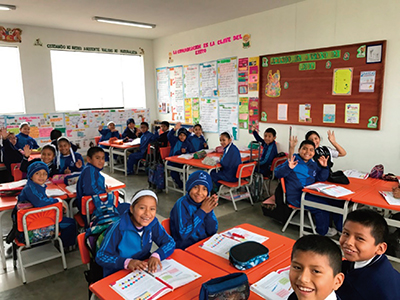
Primary school students learning in a school building constructed through Japan’s Grant Assistance for Grass-Roots Human Security Project in Callao, located in central Peru. (Photo: Embassy of Japan in Peru)
Furthermore, “Nikkei” societies have developed in various countries in Latin America and the Caribbean, and Japan has continued its efforts such as providing support for the welfare facilities of the “Nikkei” communities, accepting trainees, and dispatching “Nikkei” volunteers.
Moreover, assistance in the field of education is extremely important for Latin American and Caribbean countries, due to the existence of poverty and the insufficient educational budget. Japan has provided support for building basic educational facilities including the Project for Construction of Basic Schools in Centre and Artibonite Departments in Haiti, as well as implemented technical cooperation projects and dispatched volunteers to improve the capacity of teachers. Such efforts are highly appreciated by the local communities.
In addition, with regard to Colombia, where a domestic conflict has been ongoing for more than half a century, Japan has provided support for peacebuilding, including removing landmines and assisting victims. While taking into account the progress of the peace process, Japan decided in June 2017 to provide a grant aid to supply equipment for the disposal of landmines.
●South-South Cooperation and Cooperation with Regional Organizations
Thanks to Japan’s continuous efforts at development cooperation over many years toward Brazil, Mexico, Chile, and Argentina, these four countries have come to obtain the capacity to assist other countries, and achieved results in South-South cooperation.* Furthermore, Japan has signed partnership programs with these countries, and for example, Japan is collaborating with Argentina to provide assistance to small and medium-sized enterprises (SMEs) in Latin America, as well as in Africa. In Chile, Japan is conducting human resources development programs through triangular cooperation, in the field of disaster risk reduction, and has achieved the target number of 4,000 people.
Furthermore, Japan has also cooperating with the Central American Integration System (SICA), the Caribbean Community (CARICOM), and other regional organizations to formulate projects that cover a wide region, in order to achieve a more effective and efficient development cooperation related to development issues that are shared throughout the Latin American and Caribbean region.
- *South-South cooperation (Triangular cooperation)
- South-South cooperation refers to cooperation provided by relatively advanced developing countries to other developing countries, utilizing their experiences in development and their own human resources. In many cases, the cooperation, primarily technical cooperation, is conducted in countries that have similar natural environments and cultural and economic circumstances, and/or facing similar development processes. Support by donors or international organizations for such cooperation between developing countries is referred to as “triangular cooperation.”
●Brazil
Senior Volunteers for Nikkei Communities [Nursing-Care for the Elderly]
(June 30, 2015 – June 29, 2018)
Ms. Junko Yonaha, born in Okinawa prefecture, traveled to Brazil due to family circumstances in 1980, after working in a financial institution and other jobs. She was deeply moved by the amount of trust of the local people toward Japan, stating, “behind this trust lies the accumulation of sweat and toil that pioneers of Japanese-Brazilians, who are said to number 1.9 million across Brazil, expended for their local communities.”
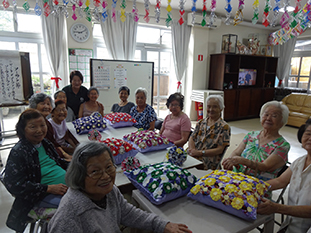
Santos Care Home residents creating cushions (Ms. Yonaha is at the back) (Photo: JICA)
After returning to Japan, Ms. Yonaha studied various techniques as a care worker. She then went back to Brazil and started to work as a Senior Volunteer for Nikkei Communities, in Santos Care Home, a nursing-care facility for the elderly, primarily those of Japanese descent, in the city of Santos, located 60 kilometers southeast of São Paulo. The majority of the residents are people over 90 years of age, who built the foundations of the Japanese community, and she supports them in leading tranquil lifestyles.
Ms. Yonaha focuses on care prevention in particular, believing that “although our physical strength declines as we age, and assistance becomes necessary, I feel that people should at least be able to eat meals by themselves. To that end, it is important to enjoy tasks that make use of our fingers, and to chat in the intervals between work.”
Ms. Yonaha carries out enjoyable activities, which can be done while chatting, with the residents, such as creating traditional Brazilian patchwork “fuxiko” cushions, using 20 meters of “bingata” patterned cloth, a traditional dyed textile of Okinawa that she has brought with her.
![[Japan’s international cooperation policy] Priority issues in the Latin American and Caribbean Region](imgs/p090.jpg)
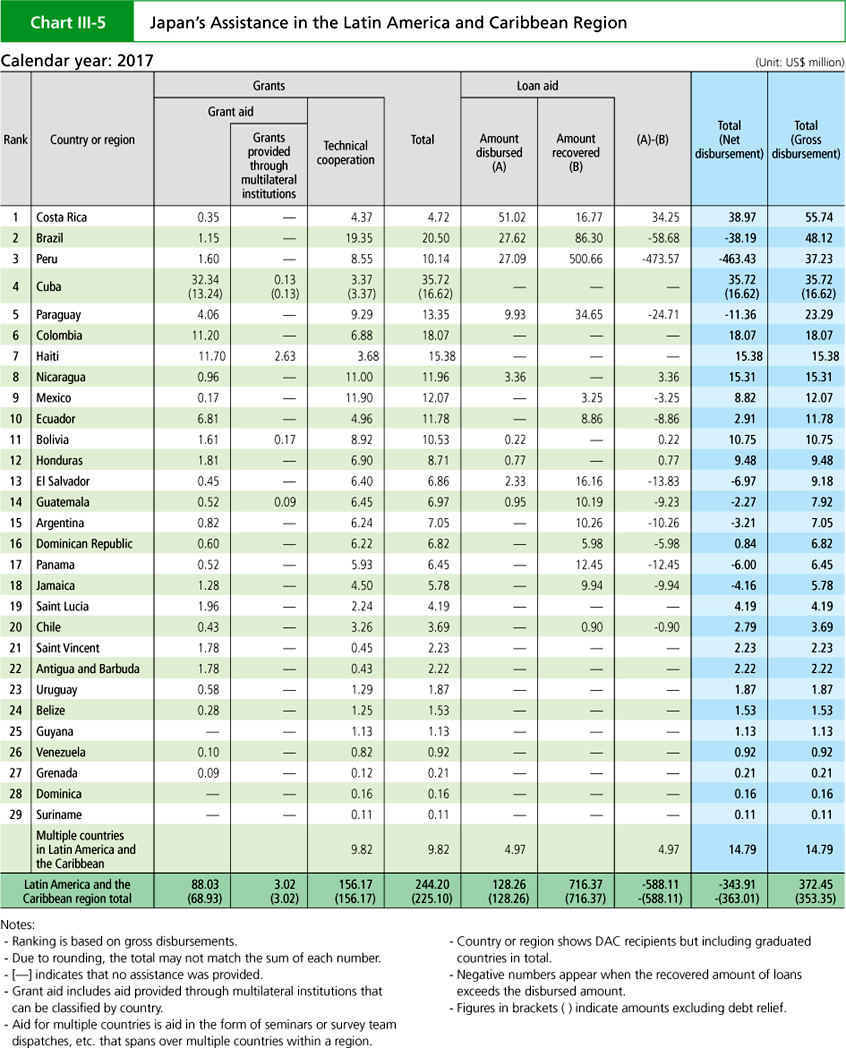
- Note 7: Changes in the amount of carbon in a given period
